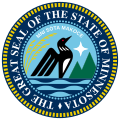| |||||||||||||||||
| |||||||||||||||||
| |||||||||||||||||
The 1875 Minnesota Secretary of State election was held on November 2, 1875, in order to elect the Secretary of State of Minnesota. Republican nominee John S. Irgens defeated Democratic nominee Adolph Biermann and Temperance nominee and former member of the Minnesota Senate John H. Stevens. [1]


